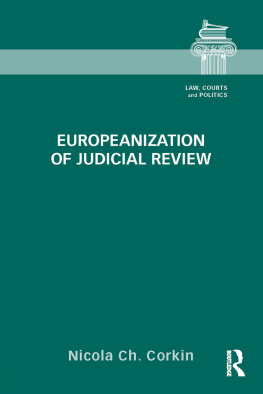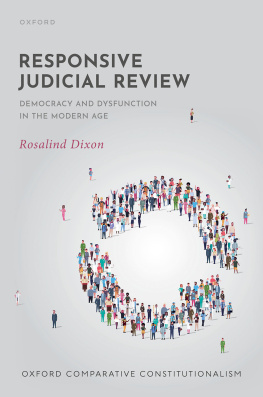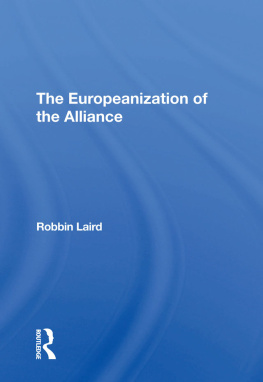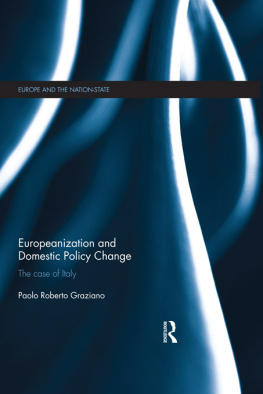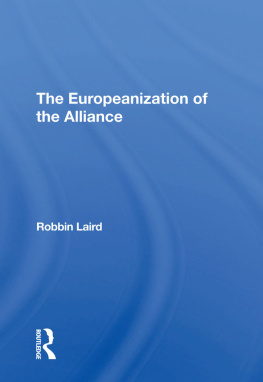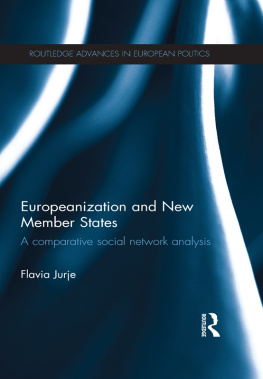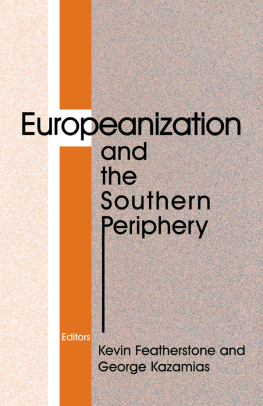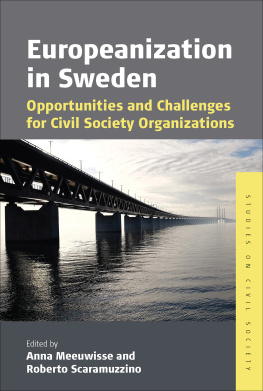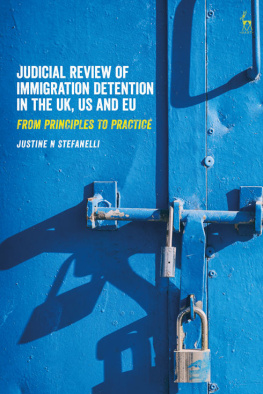Europeanization of Judicial Review
Europeanization of Judicial Review argues that the higher complexity of the political framework in which laws are made today leads to less well-designed laws and loopholes, allowing politicians to leave decisions to the courts. The higher complexity of the political framework is a result of the need in the European Union to consider both national and European legal and political rules when phrasing new laws. Both to decrease the complexity in the design of legislation and to preserve the ideal of the rule of law, the courts now are more likely to rule laws unconstitutional.
The book employs a wide range of quantitative and qualitative methods to collect new data about the German, Austrian, and Italian Constitutional Courts over the last four decades. These three courts have a comparable history, theoretical background, and structure while differing in two key components: length of EU membership and legitimacy perception. Corkin employs multi-method research based on more than 50 interviews with judges, politicians, and civil servants; content analysis of abstract judicial review cases over three decades; and a database of more than 300 variables relating to the courts and their surroundings. Her data reveal that in abstract judicial review, and in the wider political arena, political culture has become more confrontational due to attitude changes in politicians and judges. These attitude changes can be directly linked to the EU and have wide-ranging implications for legitimacy, democracy, and political methodology.
Presenting a bridge between the revitalized realist and legalist debate, Europeanization of Judicial Review will contribute to socio-legal theory, literature on comparative courts, and both new institutionalism and Europeanization theory.
Nicola Ch. Corkin is an Associate Lecturer at the University of Surrey, as well as a managing editor for the De Gruyter Open Book Program. Her specialisation lies in the area of law and politics with particular attention to the Europeanization of German, Austrian, and Italian judicial review. Additionally she works on the widening of European norms into non-EU state jurisdictions and the role of women in the law.
Law, Courts and Politics
Edited by Robert M. Howard, Georgia State University
In Democracy in America, Alexis de Tocqueville famously noted that scarcely any political question arises in the United States that is not resolved, sooner or later, into a judicial question. The importance of courts in settling political questions in areas ranging from health care to immigration shows the continuing astuteness of de Tocquevilles observation. To understand how courts resolve these important questions, empirical analyses of law, courts and judges, and the politics and policy influence of law and courts have never been more salient or more essential.
Law, Courts and Politics was developed to analyze these critically important questions. This series presents empirically driven manuscripts in the broad field of judicial politics and public law by scholars in law and social science. It uses the most up-to-date scholarship and seeks an audience of students, academics, upper division undergraduate and graduate courses in law, political science and sociology, as well as anyone interested in learning more about law, courts and politics.
1 The Dual System of Privacy Rights in the United States
Mary McThomas
2 Making Law and Courts Research Relevant
Brandon L. Bartels and Chris W. Bonneau
3 Europeanization of Judicial Review
Nicola Ch. Corkin
Europeanization of Judicial Review
Nicola Ch. Corkin
First published 2015
by Routledge
711 Third Avenue, New York, NY 10017
and by Routledge
2 Park Square, Milton Park, Abingdon, Oxon OX14 4RN
Routledge is an imprint of the Taylor & Francis Group, an informa business
2015 Taylor & Francis
The right of Nicola Corkin to be identified as author of this work has been asserted by her in accordance with sections 77 and 78 of the Copyright, Designs and Patents Act 1988.
All rights reserved. No part of this book may be reprinted or reproduced or utilized in any form or by any electronic, mechanical, or other means, now Known or hereafter invented, including photocopying and recording, or in any information storage or retrieval system, without permission in writing from the publishers.
Trademark Notice: Product or corporate names may be trademarks or registered trademarks, and are used only for identification and explanation without intent to infringe.
Library of Congress Cataloging-in-Publication Data
Catalog record for this book has been requested.
ISBN: 978-0-415-71352-8 (hbk)
ISBN: 978-1-315-88324-3 (ebk)
Typeset in Sabon
by Apex CoVantage, LLC
For Edita Ilse de Gruyter and Dagmar Corkin-Nonnenmacher
Contents
Figures
2.1a
2.1b
2.1c |
2.21a
2.21b
2.21c |
4.1a
4.1b
4.1c |
Tables
When I was 11 years old, I first came across the concept of abstract judicial review when attending a public law lecture in the company of my mother. My parents had had a very eclectic view of the education of the little accident they had produced 11 years prior, before they had even finished their own education. They believed the existence of a child was no reason to neglect their own education and, therefore, throughout the undergraduate, masters, and PhDs of first one of them, then the other, we saved on baby-sitters and I came along to whatever university threw at them. Mostly, I did my own homework and was spoiled outrageously by all the professors. But one Monday afternoon I came across the concept of judicial review and it simply did not let go of me again. What hooked the 11-year-old still hooks me today: the question why?
Why does it work? Why is the power of abstract judicial review such a particular European one? And, most importantly, why is this powerful tool so often underestimated? But really, what fascinated me most was the intricacy of the model. The years following this did give me very little opportunity to follow the intricacies of the topic, though I managed to annoy some teachers with the creative interpretation of essay questions. At university, they finally let me come out to play and they added another fascination: the European Union and its influence on abstract judicial review.
So, what exactly fascinated me? Initially, it was a mix of historical intricacy and simple comparative curiosity. Having grown up in Germany, I was too aware of the concept of never again, the watchword which accompanied the design and creation of most of the governmental structures after World War II, and the intricate position the constitutional court, and abstract judicial review in particular, holds within this concept. The German state was created to ensure there would never be another Third Reich, never again the opportunity to undermine and change the constitutional framework in order to subjugate it to commit atrocities.
Abstract judicial review was intended to increase the possible control mechanisms between the different governmental institutions, further augmented by allowing sections of parliament (a certain number of MPs, without the need for them to share a party affiliation) access to the power as well. It allows these institutions to challenge the Black Letter of the Law, promulgated and legal, in front of the constitutional court without the need for an actual concrete case in which the law had infringed upon another constitutional provision. It, therefore, allows for a more theoretical and comprehensive review of a law.


